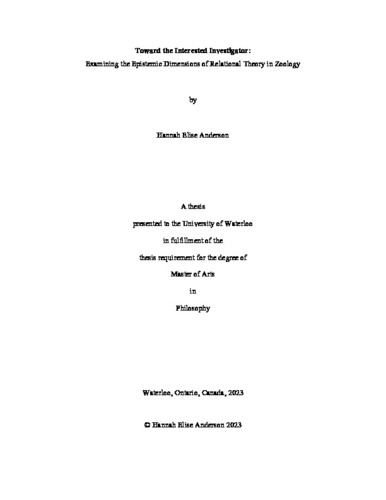| dc.contributor.author | Anderson, Hannah Elise | |
| dc.date.accessioned | 2023-08-28 15:53:42 (GMT) | |
| dc.date.available | 2023-08-28 15:53:42 (GMT) | |
| dc.date.issued | 2023-08-28 | |
| dc.date.submitted | 2023-08-17 | |
| dc.identifier.uri | http://hdl.handle.net/10012/19775 | |
| dc.description.abstract | I argue in this thesis that a research approach that is based on a meaningful relationship between a zoologist and their study subject holds unique epistemic value. It has been well established by feminist and social epistemologists that the identity and interests of the knower significantly influence the way knowledge can be created. This has been applied in philosophy of science to recognize that the identity of the scientist significantly influences the way they create scientific knowledge. Relational theorists draw our attention to the uniqueness of relationships themselves. I seek in this thesis to draw our attention to the potential epistemic influence of relationships themselves in the creation of scientific knowledge in biology. I do this by bringing together relational theory and epistemologies of ignorance to understand how scientists might influence knowledge creation in biology. I do this with a specific focus on zoology.
In Chapter 1, I perform a literature review of relational theory and its applications in the philosophy of biology. I argue here that relationality presents a fruitful axis for analyzing research and knowledge creation in zoology. Next, in Chapter 2, I present what I call a researcher’s “state of interest toward relationality”. I argue here that relational theory can be used to differentiate research approaches used by zoologists. I do this using two case studies: that of Jane Goodall’s research program with chimpanzees and Eugenie Clark’s research program with sharks. Finally, in Chapter 3, I use relational theory to analyze the creation of ignorance in zoology. I argue here that a research approach where a zoologist has a high state of interest toward relationality offers unique epistemic benefits by allowing zoologists to circumvent and/or respond to the creation of some forms of ignorance. I hope that by connecting relational theory with the epistemology of ignorance in biology, we may see ways that relationships can strengthen scientific research. | en |
| dc.language.iso | en | en |
| dc.publisher | University of Waterloo | en |
| dc.subject | relational theory | en |
| dc.subject | philosophy of biology | en |
| dc.subject | epistemology | en |
| dc.subject | ignorance | en |
| dc.title | Toward the Interested Investigator: Examining the Epistemic Dimensions of Relational Theory in Zoology | en |
| dc.type | Master Thesis | en |
| dc.pending | false | |
| uws-etd.degree.department | Philosophy | en |
| uws-etd.degree.discipline | Philosophy | en |
| uws-etd.degree.grantor | University of Waterloo | en |
| uws-etd.degree | Master of Arts | en |
| uws-etd.embargo.terms | 0 | en |
| uws.contributor.advisor | Fehr, Carla | |
| uws.contributor.affiliation1 | Faculty of Arts | en |
| uws.published.city | Waterloo | en |
| uws.published.country | Canada | en |
| uws.published.province | Ontario | en |
| uws.typeOfResource | Text | en |
| uws.peerReviewStatus | Unreviewed | en |
| uws.scholarLevel | Graduate | en |

